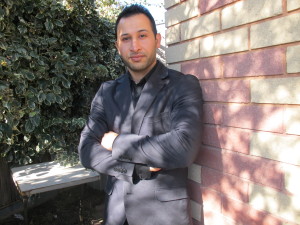Search for language and culture leads to persecution
Iranian asylum seeker Mohamad Khalil Ghobeishavi needs to work.
Being active keeps his mind off his troubled and traumatic past; and he is a man who finds it difficult to do nothing.
As a member of the Arab ethnic minority in Iran, all his life his cards have been marked against him. Several of his friends have been arrested, tortured and/or executed by the Iranian secret police.
And when the Iranian government discovered his work as an activist for his community, he was forced to flee for his life eventually making a boat journey to Australia.
Recently, Mohamad was granted work rights and is now painting houses in Melbourne’s northern suburbs near where he lives in a rented house with two other asylum seekers.
He says being able to work has changed his life for the good; giving him confidence and a reason to get out of bed.
He is able to support himself and his family back in Iran and he can now – for the first time in several years – think about his future.
“Working has been a big help for me. It is not good to sit around at home and think about things too much. It is not good to think about my friends and my family and the problems at home,” Mohamad said.
“Also, I don’t want to sit around doing nothing and be given money by the government. I want to do something for myself,” he said.
Mohamad comes from Ahwaz an area in the southern part of Iran populated largely by ethnic Arabs who for decades have been persecuted by the Persian-dominated government.
Arabs in Iran are not allowed to wear their traditional dress, speak their language or take Arabic names.
Their history and that of Arabistan, a once autonomous region, has been effectively wiped out by the Iranian government.
The region was seized by Reza Shah (the father of the last Shah of Iran) in the 1920s who imprisoned and the executed Sheikh Khazaal the leader of the Arabs ending Arab autonomy.
Mohamad says he ran a book shop in Ahwaz and became involved in distributing pamphlets explaining the history of the region and its people to youngsters, who had never heard the stories.
He says he and his friends also discovered a plan to remove Arabs to other regions of Iran and populate Ahwaz with Persians.
“There is a lot of oil in Ahwaz but the government doesn’t let the local people benefit from it. Arabs do not have an easy life and we are not free. We are in constant fear of being put in jail,” Mohamad said.
“The government chooses what clothes we wear, what we name our children and which language we speak. We are not allowed our own traditions we have to follow Persian traditions and language,” he said.
“I left Iran because I had a very big problem with the government,” Mohamad says euphemistically.
“We were trying to tell the young people that the Arabs in Iran did have a history and a culture that was valid and important. We wanted the people to know the history of what had happened to us more than 80 years ago; many of the young people knew nothing about this because it was not allowed to be taught in schools,” Mohamad said.
“We tried to get people to ask questions about why we could not even wear our traditional dress or give our children Arabic names,” he said.
Mohamad says he kept his work secret even from his own family because the Iranian secret police had spies and informers on every street.
“We had to be very careful because the police would kill us without even thinking. One of my friends was put in jail for two years for circulating this information. Then they killed him,” he said.
While he was on a trip to another city to buy books, Mohamad’s shop was raided by the secret police who found copies of the pamphlets.
His family told him not to come home or he’d be arrested; he’d been locked up for 12 days a year earlier simply for having a few Arabic language books in his shop.
“My family said it was very dangerous for me; that I could not come home. They said I would be killed,” Mohamad said.
He asked a friend to help him get away. The friend made some calls and helped him get to Tehran where Mohamad acquired a fake passport and got on a plane to Indonesia.
From there he got aboard a people smuggler boat to Christmas Island and spent time in immigration detention in Darwin until he was released into the community.
“Every day I think about my people,” Mohamad said.
“I knew what I was doing was dangerous but many of my people were losing their lives and I could not do nothing,” he said.
Laurie Nowell
AMES Australia Senior Journalist













